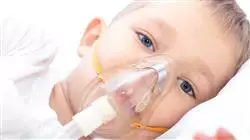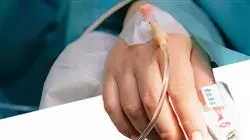University certificate
Accreditation/Membership

The world's largest faculty of medicine”
Introduction to the Program
Get up to date with the most relevant advances in allergen-specific immunotherapy (AIT), which have allowed the development of pioneering treatments adapted to the needs of each patient"

Advances in molecular diagnostics in pediatrics are particularly promising, as in recent years they have made it possible to fine-tune the patient's sensitization profile to the millimeter. This inevitably leads to a favorable framework for action, with a more personalized allergen-specific immunotherapy (AIT) adapted to the allergic conditions of each patient. The role of the specialists in the whole process of diagnosis and recommendation of the avoidance diet is crucial, so their level of updating must be high and constant.
A deeper knowledge of immune development in children allows us to understand the evolution of certain pathologies in childhood in later years. A team of teachers specialized in Pediatric Allergology has developed a complete syllabus that compiles not only the advances and developments in this field, but also its impact on clinical practice. In this way, the specialist obtains a necessary pragmatic vision from professionals widely versed in the field of allergies and immunology, thereby perfecting their own work methodologies and approach to each subject treated.
Throughout the program, the most frequent consultations in the Pediatric Allergology area as well as the rare pathologies that usually occur in childhood will be discussed. The specialist will cover, through high quality multimedia content, cutaneous allergic manifestations, food allergens, asthmatic pathologies in children and infants, frequent atopic dermatitis and other essential topics for a comprehensive and exhaustive update in a far-reaching clinical field.
All this, in addition, with the advantage of having the characteristic flexibility of a 100% online format. TECH is aware of how complicated it can be to combine a program of these characteristics with the most demanding medical activity, so it has eliminated both classroom classes and fixed schedules. It is the specialists themselves who decide how to distribute all the teaching content, being able to download it and study it from any device with an internet connection.
Get up to date with a team of highly committed teachers, who have compiled the most important practical developments in allergology protocols in this program"
This Professional master’s degree in Pediatric Allergology contains the most complete and up-to-date scientific program on the market. The most important features include:
- The development of practical cases presented by experts in Pediatric Allergology
- The graphic, schematic, and practical contents with which they are created, provide scientific and practical information on the disciplines that are essential for professional practice
- Practical exercises where self assessment can be used to improve learning
- Its special emphasis on innovative methodologies
- Theoretical lessons, questions to the expert, debate forums on controversial topics, and individual reflection assignments
- Content that is accessible from any fixed or portable device with an Internet connection
Access a virtual classroom that will be available 24 hours a day, full of high quality multimedia content to further deepen all facets of Pediatric Allergology"
The program’s teaching staff includes professionals from the sector who contribute their work experience to this training program, as well as renowned specialists from leading societies and prestigious universities.
The multimedia content, developed with the latest educational technology, will provide the professional with situated and contextual learning, i.e., a simulated environment that will provide immersive education programmed to learn in real situations.
This program is designed around Problem-Based Learning, whereby the professional must try to solve the different professional practice situations that arise throughout the program. For this purpose, the student will be assisted by an innovative interactive video system created by renowned and experienced experts.
You will be able to decide where, when and how to take on the entire course load, being able to study the entire syllabus from the comfort of your tablet or even smartphone of choice"

It delves into new developments in drug allergy, including antibiotic allergy, vaccines and drug desensitization"
Why study at TECH?
TECH is the world’s largest online university. With an impressive catalog of more than 14,000 university programs available in 11 languages, it is positioned as a leader in employability, with a 99% job placement rate. In addition, it relies on an enormous faculty of more than 6,000 professors of the highest international renown.

Study at the world's largest online university and guarantee your professional success. The future starts at TECH”
The world’s best online university according to FORBES
The prestigious Forbes magazine, specialized in business and finance, has highlighted TECH as “the world's best online university” This is what they have recently stated in an article in their digital edition in which they echo the success story of this institution, “thanks to the academic offer it provides, the selection of its teaching staff, and an innovative learning method aimed at educating the professionals of the future”
A revolutionary study method, a cutting-edge faculty and a practical focus: the key to TECH's success.
The most complete study plans on the university scene
TECH offers the most complete study plans on the university scene, with syllabuses that cover fundamental concepts and, at the same time, the main scientific advances in their specific scientific areas. In addition, these programs are continuously being updated to guarantee students the academic vanguard and the most in-demand professional skills. In this way, the university's qualifications provide its graduates with a significant advantage to propel their careers to success.
TECH offers the most comprehensive and intensive study plans on the current university scene.
A world-class teaching staff
TECH's teaching staff is made up of more than 6,000 professors with the highest international recognition. Professors, researchers and top executives of multinational companies, including Isaiah Covington, performance coach of the Boston Celtics; Magda Romanska, principal investigator at Harvard MetaLAB; Ignacio Wistumba, chairman of the department of translational molecular pathology at MD Anderson Cancer Center; and D.W. Pine, creative director of TIME magazine, among others.
Internationally renowned experts, specialized in different branches of Health, Technology, Communication and Business, form part of the TECH faculty.
A unique learning method
TECH is the first university to use Relearning in all its programs. It is the best online learning methodology, accredited with international teaching quality certifications, provided by prestigious educational agencies. In addition, this disruptive educational model is complemented with the “Case Method”, thereby setting up a unique online teaching strategy. Innovative teaching resources are also implemented, including detailed videos, infographics and interactive summaries.
TECH combines Relearning and the Case Method in all its university programs to guarantee excellent theoretical and practical learning, studying whenever and wherever you want.
The world's largest online university
TECH is the world’s largest online university. We are the largest educational institution, with the best and widest online educational catalog, one hundred percent online and covering the vast majority of areas of knowledge. We offer a large selection of our own degrees and accredited online undergraduate and postgraduate degrees. In total, more than 14,000 university degrees, in eleven different languages, make us the largest educational largest in the world.
TECH has the world's most extensive catalog of academic and official programs, available in more than 11 languages.
Google Premier Partner
The American technology giant has awarded TECH the Google Google Premier Partner badge. This award, which is only available to 3% of the world's companies, highlights the efficient, flexible and tailored experience that this university provides to students. The recognition as a Google Premier Partner not only accredits the maximum rigor, performance and investment in TECH's digital infrastructures, but also places this university as one of the world's leading technology companies.
Google has positioned TECH in the top 3% of the world's most important technology companies by awarding it its Google Premier Partner badge.
The official online university of the NBA
TECH is the official online university of the NBA. Thanks to our agreement with the biggest league in basketball, we offer our students exclusive university programs, as well as a wide variety of educational resources focused on the business of the league and other areas of the sports industry. Each program is made up of a uniquely designed syllabus and features exceptional guest hosts: professionals with a distinguished sports background who will offer their expertise on the most relevant topics.
TECH has been selected by the NBA, the world's top basketball league, as its official online university.
The top-rated university by its students
Students have positioned TECH as the world's top-rated university on the main review websites, with a highest rating of 4.9 out of 5, obtained from more than 1,000 reviews. These results consolidate TECH as the benchmark university institution at an international level, reflecting the excellence and positive impact of its educational model.” reflecting the excellence and positive impact of its educational model.”
TECH is the world’s top-rated university by its students.
Leaders in employability
TECH has managed to become the leading university in employability. 99% of its students obtain jobs in the academic field they have studied, within one year of completing any of the university's programs. A similar number achieve immediate career enhancement. All this thanks to a study methodology that bases its effectiveness on the acquisition of practical skills, which are absolutely necessary for professional development.
99% of TECH graduates find a job within a year of completing their studies.
Professional Master's Degree in Pediatric Allergology
Faced with the increase in the number of cases related to food, respiratory, dermatological and pharmacological allergies, as well as the manifestation of anaphylactic reactions in children and adolescents, it is necessary to develop effective response mechanisms to mitigate the situation and provide an adequate response. At TECH Global University we have developed the Professional Master's Degree in Pediatric Allergology, a specialization program that will allow you to efficiently address the most complex cases in this field using the most advanced knowledge and methodologies. In this way, you will be able to become an expert in the intervention of various allergic and immunological disorders, in addition to contributing to the field of immunotherapy and allergology by obtaining results that optimize the quality of medical care in this area.
Specialize in the largest School of Medicine
At TECH Global University we offer a unique specialization program that brings together in a complete and updated way the latest advances in this discipline. Supported by a theoretical and practical curriculum that was designed with the highest quality standards, you will acquire superior knowledge in the different diagnostic and therapeutic options available for the detection and treatment of allergic disorders, taking into account their source of origin, diverse symptomatology and effects on the patient's body. At the largest School of Medicine you will be able to take a definitive step to propel your career to the next level, becoming a key player in the field of Pediatric Allergology.







